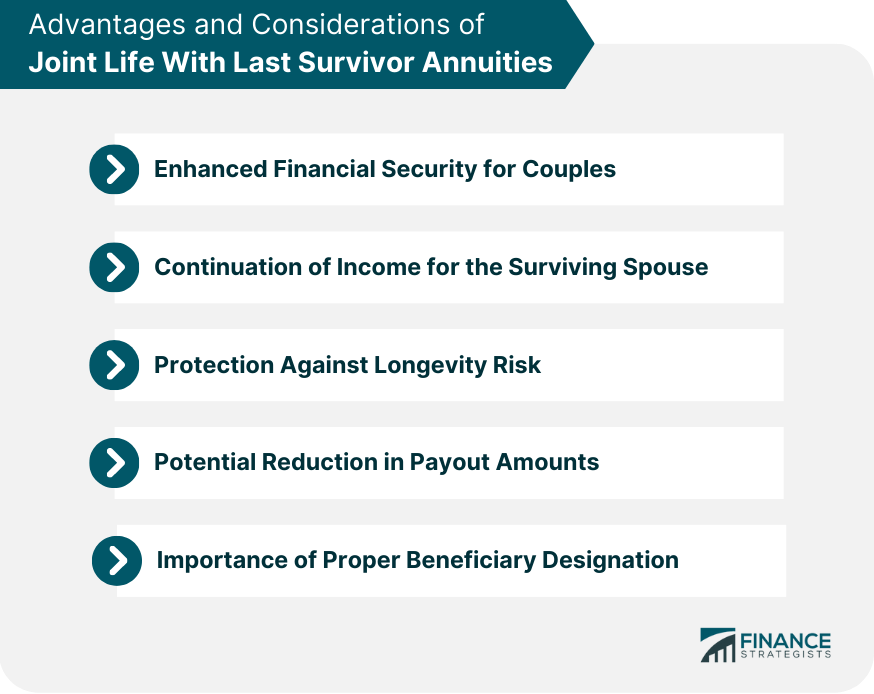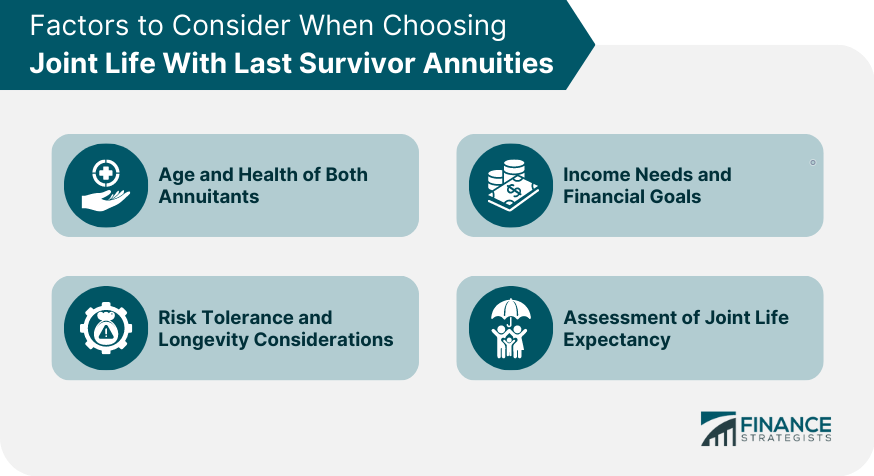Joint Life with Last Survivor Annuity is a type of annuity designed for couples. It provides regular income payments throughout the lives of both individuals, with the added benefit of continuing payments to the surviving spouse after the death of one annuitant. This annuity ensures that the surviving spouse receives financial support, helping to maintain their quality of life. In Joint Life with Last Survivor Annuity, the key participants are the two annuitants: the primary annuitant and the joint annuitant (often the spouse). The primary annuitant's life expectancy and other factors impact the initial payout amounts, while the joint annuitant's survival determines the continuation of payments after the primary annuitant's death. Unlike Single Life Annuities that cease payments upon the death of the annuitant, Joint Life with Last Survivor Annuity provides ongoing income for the surviving spouse. This key distinction makes it a popular choice for couples seeking to ensure financial stability for both partners during retirement. Joint Life with Last Survivor Annuity offers various payment options, including fixed term or lifetime payments. The specific payment structure determines the frequency and duration of the annuity payments. The payout amounts for Joint Life with Last Survivor Annuity are influenced by several factors, such as the age and health of both annuitants. Actuarial calculations play a crucial role in estimating the appropriate payout amounts based on life expectancies and other actuarial principles. The age and gender of the annuitants, as well as their joint life expectancy, impact the payout amounts of Joint Life with Last Survivor Annuity. Generally, younger annuitants with longer life expectancies receive lower initial payouts, while older annuitants with shorter life expectancies receive higher payouts. Joint Life with Last Survivor Annuity provides couples with a sense of financial security. It ensures that both partners receive a regular income stream throughout their lifetimes, mitigating the risk of running out of funds in retirement. Upon the death of the primary annuitant, Joint Life with Last Survivor Annuity guarantees the continuation of income for the surviving spouse. This feature helps the surviving spouse maintain their standard of living and meet ongoing financial obligations. Joint Life with Last Survivor Annuity safeguards against longevity risk, which is the risk of outliving one's retirement savings. By providing lifetime payments for both annuitants, this annuity option ensures that income continues even if one spouse lives longer than expected. Due to the added benefit of continued payments for the surviving spouse, Joint Life with Last Survivor Annuity may result in lower initial payout amounts compared to Single Life Annuities. Individuals should weigh the trade-off between higher initial payouts and the long-term financial security provided by Joint Life with Last Survivor Annuity. When selecting Joint Life with Last Survivor Annuity, it is crucial to designate the appropriate beneficiary. The surviving spouse is typically the primary beneficiary, ensuring they continue to receive payments after the death of the primary annuitant. Careful consideration should be given to contingent beneficiaries in case both annuitants pass away simultaneously. Single Life Annuity provides income for the lifetime of the primary annuitant only, with no continuation of payments to a surviving spouse. This option offers higher initial payouts but does not provide financial support for the surviving spouse. The choice between Joint Life with Last Survivor Annuity and Single Life Annuity depends on the couple's priorities and financial circumstances. Period Certain Annuity guarantees payments for a fixed period, regardless of the annuitant's lifespan. This differs from Joint Life with Last Survivor Annuity, which provides lifetime income for both annuitants. A Period Certain Annuity can be advantageous for couples with specific financial goals or obligations, such as ensuring income during a specific period, but it does not offer the same level of long-term security as Joint Life with Last Survivor Annuity. The age and health of both annuitants are crucial factors in determining the suitability of Joint Life with Last Survivor Annuity. Younger and healthier couples may benefit from the potential for longer payout periods, while older or less healthy couples might prioritize higher initial payouts. Understanding the couple's income needs and financial goals is essential when considering Joint Life with Last Survivor Annuity. Assessing current and future expenses, lifestyle requirements, and legacy planning can help determine if this annuity option aligns with their objectives. Different individuals have varying risk tolerances and perspectives on longevity. Some may prefer the security of ongoing income for both spouses, while others may prioritize higher initial payouts or flexibility. Evaluating risk tolerance and considering the potential length of retirement is crucial when selecting Joint Life with Last Survivor Annuity. Joint life expectancy is a critical factor in Joint Life with Last Survivor Annuity. Actuarial calculations based on joint life expectancy influence the payout amounts. Couples should evaluate their health histories, family longevity, and lifestyle factors to gauge their expected joint life expectancy accurately. Actuarial calculations for Joint Life with Last Survivor Annuity involve various principles and assumptions. Mortality tables, life expectancy data, interest rates, and other factors guide the determination of payout amounts based on actuarial principles. Actuarial calculations consider the joint life expectancy, age of both annuitants, and other relevant factors to calculate the initial payout amounts for Joint Life with Last Survivor Annuity. These calculations help ensure the annuity's sustainability while providing financial security to the couple. Mortality tables and life expectancy data provide the foundation for actuarial calculations in Joint Life with Last Survivor Annuity. These resources offer insights into the average lifespan of individuals based on age, gender, and other demographic factors. Actuaries utilize this data to determine the appropriate payout amounts and predict the financial sustainability of the annuity. Seeking guidance from financial advisors and retirement planning professionals is highly recommended when considering Joint Life with Last Survivor Annuity. These experts can provide personalized advice, assess individual circumstances, and help determine the most suitable annuity option for couples. Online resources, such as annuity calculators and estimators, offer convenient tools to explore different scenarios and calculate potential payouts. These tools allow couples to input their specific details and receive estimates of payout amounts based on Joint Life with Last Survivor Annuity. Actuarial resources, including mortality tables, life expectancy data, and actuarial reports, provide valuable insights into the calculations and principles behind Joint Life with Last Survivor Annuity. Consulting these resources can enhance understanding and facilitate informed decision-making. Joint Life with Last Survivor Annuity ensures that both partners receive a steady stream of income throughout their lifetimes, with continued payments to the surviving spouse after the death of the primary annuitant. It is essential to grasp its key features, such as the payment structure, determination of payout amounts, and factors affecting payouts. Several factors should be considered when choosing Joint Life with Last Survivor Annuity, including the age and health of both annuitants, income needs and financial goals, risk tolerance, and joint life expectancy. Actuarial calculations, based on mortality tables and life expectancy data, play a crucial role in determining the appropriate payout amounts for this annuity option. Resources such as financial advisors, online annuity calculators, and actuarial data provide valuable support in making informed decisions. In conclusion, Joint Life with Last Survivor Annuity offers couples the peace of mind of ongoing financial security in retirement. By understanding its features, comparing it to other annuity options, and considering individual circumstances, couples can make informed decisions to safeguard their financial well-being throughout their lifetimes and provide for the surviving spouse.What Is a Joint Life With Last Survivor Annuity?
Mechanics of Joint Life With Last Survivor Annuities
Payment Structure and Options
Determining Payout Amounts
Factors Affecting Payouts
Advantages and Considerations of Joint Life With Last Survivor Annuities
Enhanced Financial Security for Couples
Continuation of Income for the Surviving Spouse
Protection Against Longevity Risk
Potential Reduction in Payout Amounts
Importance of Proper Beneficiary Designation

Joint Life With Last Survivor Annuities vs Other Options
Single Life Annuity
Period Certain Annuity
Factors to Consider When Choosing Joint Life With Last Survivor Annuities
Age and Health of Both Annuitants
Income Needs and Financial Goals
Risk Tolerance and Longevity Considerations
Assessment of Joint Life Expectancy

Role of Actuarial Calculations in Joint Life With Last Survivor Annuities
Actuarial Principles and Assumptions
Calculation of Joint Life With Last Survivor Annuity Payouts
Role of Mortality Tables and Life Expectancy Data
Resources and Tools for Joint Life With Last Survivor Annuities
Financial Advisors and Retirement Planning Professionals
Online Annuity Calculators and Estimators
Actuarial Resources and Data
Final Thoughts
Joint Life With Last Survivor Annuity FAQs
Joint Life with Last Survivor Annuity is an annuity option designed for couples, providing regular income payments throughout both individuals' lifetimes. It ensures continued payments to the surviving spouse after the death of the primary annuitant.
Joint Life with Last Survivor Annuity differs from Single Life Annuity in that it continues to provide income for the surviving spouse after the death of the primary annuitant. Single Life Annuity ceases payments upon the death of the annuitant.
The payout amounts in Joint Life with Last Survivor Annuity are influenced by several factors, including the age and health of both annuitants, joint life expectancy, and other actuarial calculations. These factors help determine the initial payout amounts and ensure the sustainability of the annuity.
Joint Life with Last Survivor Annuity offers several advantages. It provides enhanced financial security for couples, ensuring ongoing income for both partners during their lifetimes. It also protects against longevity risk and guarantees continued payments to the surviving spouse, maintaining their standard of living.
Joint Life with Last Survivor Annuity may not be suitable for all couples. Factors such as age, health, financial goals, risk tolerance, and joint life expectancy should be considered when deciding on this annuity option. Couples should assess their unique circumstances and consult with financial advisors to determine the most suitable choice for their retirement needs.
True Tamplin is a published author, public speaker, CEO of UpDigital, and founder of Finance Strategists.
True is a Certified Educator in Personal Finance (CEPF®), author of The Handy Financial Ratios Guide, a member of the Society for Advancing Business Editing and Writing, contributes to his financial education site, Finance Strategists, and has spoken to various financial communities such as the CFA Institute, as well as university students like his Alma mater, Biola University, where he received a bachelor of science in business and data analytics.
To learn more about True, visit his personal website or view his author profiles on Amazon, Nasdaq and Forbes.











